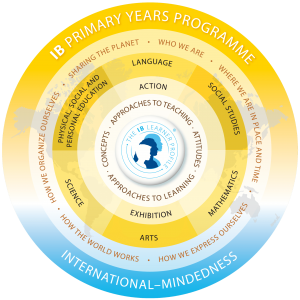The IB Primary Years Programme (PYP) is designed for students aged 4 to 12 (grades Preschool – 5). It is a transdisciplinary programme of international education designed to foster the development of the whole child. It focuses on the total growth of the developing child, touching hearts, as well as minds and encompassing social, physical, emotional, and cultural needs in addition to academic development. The PYP curriculum has an international perspective where the diversity of student experiences and backgrounds is welcomed and celebrated. As a PYP school we strive towards developing internationally minded persons who have a strong sense of agency and demonstrate the attributes of the Learner Profile, which represent the qualities of a life-long learner. Concept based inquiry is the leading pedagogical approach of the enhanced PYP and is the basis for all learning and teaching in the programme. Inquiry is an authentic way for students to explore and understand the world, nurturing their curiosity as they move from current to new and deeper understandings, and embark on a lifelong journey of learning. Learning how to learn is fundamental to a student’s education and therefore Approaches to Learning are an integral part of an IB education. The Approaches to Learning develop five categories of interrelated skills and associated sub-skills, which are transferable to different types of learning and school contexts. When combined with the learner profile, development of the approaches to learning will help students learn how to learn and become self- regulated, active, and agentic learners. The IB knows that young learners are intelligent, resourceful and creative individuals who grow, develop, and learn at different rates. Early learning in the PYP is a holistic learning experience that integrates socio-emotional, physical, and cognitive development. The power of play is the primary vehicle for inquiry, supporting thoughtful and intentional opportunities for child-initiated play, hands-on learning, and the co-construction of learning between teachers and young learners. Through play and exploration, and relationships with peers, teachers, family, and community members, students will learn to inquire as they build and test theories to help make sense of the world around them. The PYP recognizes the importance of traditional subjects but even more it emphasizes the need for using the knowledge and skills of these subjects to explore significant concepts that are global and common for all humans. Therefore, the PYP has identified six transdisciplinary themes that are explored through 6 units of inquiry in each grade level. The early years have only four units of inquiry. Each unit of inquiry has a conceptual central idea and lines of inquiry. The different units together create ISE’s Programme of Inquiry. The units have flexible timeframes giving ample of time for the students to demonstrate their prior knowledge and understanding, explore, wonder, experiment, solve problems, question, research, read, view, visit places, interview people, make connections, make meaning, and construct new knowledge and understanding. It is clear that not everything can always be integrated therefore there is time for subject specific learning. Then the teachers encourage inquiry and learning to act and think as musicians, artists, sportsmen, mathematicians, readers and writers. To celebrate and demonstrate what the children have learned we have class gatherings, use digital portfolios, invite parents and schoolmates for presentations, show it in many forms during the monthly PYP Assembly, and have student led conferences twice a year. Student-initiated action is considered an integral part of the learning process that can arise at any time. The students are continuously encouraged to reflect on their learning, make choices and take actions that will help not only individuals, but also a wider community. Action, agency, the learner profile, and international mindedness will work hand in hand to strengthen students’ confidence in their capacity to make a positive change in the world. You may learn more about PYP (Primary Years Programme) at the IBO webpage. Visit our page on the IBO website for more information about our programs.PYP Programme: Preschool to Grade 5
IB PYP Parent Pack
Contact Information: Terje Äkke
IB PYP Coordinator
